
Are you one of the 9 million people who struggle with irritating yeast infections?
Thankfully, there are more options for treating yeast infections than waiting it out or using messy antifungal creams. With Chinese herbs for yeast infections, you can clear the overgrowth, stop your symptoms, and boost your immune system to prevent another yeast infection from arising.
Read on to learn why we develop yeast infections and which Chinese herbs can help.
What are Yeast Infections?
Yeast is (candida albicans) a common fungus that is naturally found on the skin, in the digestive tract, and in the vagina. But when yeast grows out of control, a candida yeast infection develops.
Yeast infections can occur in the skin, mouth, genitals, or even systemically through the body. They are fungal infections that cause itching, irritation, and white, cottage cheese-like discharge.
Vaginal yeast infections, or vaginal candidiasis, are the most common types of candida infections. In fact, 3 out of 4 women will get a yeast infection at some point in their lives.
What Causes Yeast Infections?
Yeast infections occur when the natural balance of yeast and bacteria in our skin, genitals, or intestinal flora changes. Yeast is moderated by the Lactobacillus bacteria. When the microbiome shifts (due to low immunity, diet, or stress), the helpful bacteria diminishes and the balance is thrown off. The bacteria is no longer able to keep the yeast in check and yeast takes over.
What Are the Different Types of Yeast Infections?
- Vaginal candidiasis
Vaginal candidiasis is the most commonly known type of yeast infection. It causes redness, burning, and a cottage cheese-like discharge.
- Oral candidiasis
A candida overgrowth that occurs in the mouth is considered oral candidiasis, or oral thrush. Oral thrush causes white patches on the tongue that are easily wiped off. It is most commonly seen in babies, where yeast passes from the mother’s vagina to the baby during birth.
- Candidal balanitis
Yeast infection can occur in men, too. And when they do, they are called “candidal balanitis.” This type of infection tends to occur in uncircumcised men, and repeated infections may lead to prostate issues.
- Cutaneous candidiasis
This is a yeast infection that occurs on the skin, fingernails, toenails, or nail beds. It is most commonly seen with diaper rash in babies, and areas where their skin folds and creases.
- Invasive candidiasis
This rare type of yeast infection occurs when candida gets into the digestive tract or bloodstream and causes a systemic (whole-body) infection.
How Do You Treat a Yeast Infection?
Western medicine treats yeast infections with powerful antifungal medications. While this usually clears up an acute infection, chronic or recurrent candida yeast infections may need a more intense treatment plan. Recurrent infections often signal a weakness in the immune system, which should be addressed through diet and natural therapies like Chinese herbal medicine.
Traditional Chinese Medicine Treatment for Yeast Infections
Traditional Chinese Medicine (TCM) sees infections like candidiasis as a symptom of an underlying imbalance in the body. Here are a few factors that lead to the development of yeast infections:
- Weak Spleen Qi
In TCM, the Spleen is responsible for taking food and fluids and processing them into Qi (energy) and blood. When the Spleen is in balance, we have a healthy balance of intestinal flora that supports our digestive and immune systems. When the Spleen is weak, however, dampness forms in the gut and can spread through to the organs below.
- Dampness
Dampness is a concept unique to Chinese medicine. In Western medicine, the equivalent of dampness is excess fluids, swelling, fat, mucus, pus, and microbial overgrowth – like candida. We can “see” dampness in the white, cheesy vaginal discharge or oral thrush that comes with yeast infections. We can “feel” dampness in the fatigue, nausea, and brain fog that often accompanies a condition like this. Along with using herbs that eliminate this dampness, TCM recommends avoiding foods that increase dampness in the body (like sugar, fried food, and dairy products).
- Heat
Heat is another major underlying factor in fungal infections. Heat (or inflammation) is usually involved if there is severe itching, redness, soreness, dark urine, foul-smelling loose stools or constipation, or vaginitis.
Chinese medicine uses acupuncture and Chinese herbal medicine to rid the body of excess yeast or fungal overgrowth. In most cases, it’s a two-step process.
First, anti-inflammatory, anti-fungal herbs are taken to clear away the infection. The herbs that kill yeast tend to be cold, bitter, and have a draining effect, much like an antibiotic.
Then, a balancing formula is taken to support the body and prevent future infections. These herbal formulas tend to focus on strengthening the Spleen Qi to stop dampness at the root.
Best Chinese Herbs for Yeast Infections
Huang Lian Jie Du Teapills
Huang Lian Jie Du Wan features the herb huang lian, a powerfully cold and bitter herb that cools inflammation and drains damp-heat in the digestive and reproductive systems. This formula can help treat genital or oral yeast infections with signs of heat.
Yu Dai Wan
Yu Dai Wan is a formula that supports female reproductive health. It can help clear infections like urinary tract infections, yeast infections, and vaginitis. Unlike intense clearing formulas like Huang Lian Jie Du Pian, this formula also has a nurturing effect on the reproductive system. As such, it can also be used to reduce PMS and support healthy hormone balance.
Best Chinese Herbs for BV (Bacterial Vaginosis)
While bacterial vaginosis (BV) is not a yeast infection but rather a bacterial infection, it presents with similar symptoms (like itching, burning, irritation, and discharge). To manage BV, we need to clear dampness and heat. In addition to the formulas above for yeast infections, these two formulas may help, depending on your unique situation.
Zhi Bai Di Huang Tang Tincture
Zhi Bai Di Huang Tang is a formula that is typically used to help reduce menopause symptoms. In some cases of BV, however, this formula can help reduce inflammation when there are also signs of yin deficiency (such as dry skin, insomnia, or weak knee or back).
Long Dan Xie Gan Wan
Long Dan Xie Gan Wan is a commonly used formula to fight infection, especially when there is a lot of heat and dampness present. If you’re experiencing a bacterial or fungal infection with hot, burning urination, fever, headache, redness, or intense itching or burning in the genitals, this formula can help.
Best Chinese Herbs for Fungal Infection Prevention
After an infection is cleared, we need to support the body from the root to prevent a new infection from occurring. In most cases, the best approach is to strengthen the Spleen system. This promotes a healthier microbiome throughout the body and prevents dampness build-up. There are several different formulas to support healthy Spleen qi, but most people will benefit from one of these formulas.
Huo Xiang Zheng Qi Tang
Huo Xiang Zheng Qi Tang supports the Spleen by clearing excess dampness and optimizing the Spleen’s function. This formula is best for those who have a robust constitution but struggle with stubborn dampness accumulation. Take this formula for a few days after the infection is gone to clear up residual dampness in the gut, then switch to Xiang Sha Liu Jun Zi Tang.
Xiang Sha Liu Jun Zi Tang (Six Gentlemen Plus)
Six Gentlemen Decoction is a classic formula used to boost Qi and improve overall health. In this “plus” version, we add two herbs that harmonize the Spleen and Stomach and improve qi flow through the digestive tract. This prevents dampness and microbial overgrowth.
-
Sale!
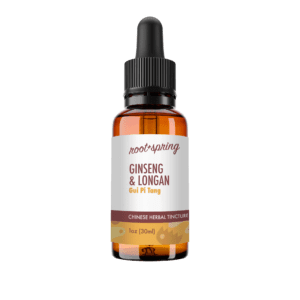 Gui Pi Tang (Ginseng and Longan) – Liquid Extract (Tincture)
Starting at $14.00
Add to CartSelect options
This product has multiple variants. The options may be chosen on the product page
Gui Pi Tang (Ginseng and Longan) – Liquid Extract (Tincture)
Starting at $14.00
Add to CartSelect options
This product has multiple variants. The options may be chosen on the product page
Gui Pi Tang
For those with a weak constitution and other signs of Spleen deficiency (fatigue, weight gain, sallow complexion, low appetite), Gui Pi Tang can help. This formula is a gentle tonic that boosts qi and strengthens the Spleen.
Chinese Herbs for Yeast Infections: Frequently Asked Questions
- How long do you take these herbs to clear an infection? How often can you take the herbs?
There are two different types of Chinese herbs for yeast infections: formulas that clear the infection, and those that support the body to prevent future overgrowth. The formulas to treat a current infection are meant to be taken 2-3 times per day for a short time (or until the infection has cleared). The formulas that help you restore balance can be taken as a daily, ongoing tonic.
- Can babies take Chinese herbs for oral thrush?
Babies and children can take Chinese herbs for many conditions. But, because the herbs used to fight yeast infections can be strong, we recommend giving herbs to children only under the supervision of an herbalist or physician.
- What herbs are safe to take while pregnant?
If you’re experiencing a yeast infection while pregnant, it’s best to talk with your obstetrician before taking any herbs, supplements, or medications.
- Can Chinese herbs be mixed with antifungal medication?
Chinese herbal medicine can be taken in conjunction with many fungal and antimicrobial medications – and can offer faster results when used together. We recommend asking your doctor about using Chinese herbs to support your yeast infection treatment plan.
Stop Yeast Infections at the Source with Chinese Herbal Medicine
Yeast infections aren’t just uncomfortable – they’re a sign that your body is out of balance and needs support. With help from Chinese herbs for yeast infections, you can quickly and naturally clear inflammation, kill the infection, and restore your microbiome balance.
Shop now for these and other Chinese herbs for urinary and reproductive health!


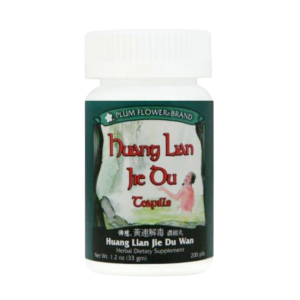 Plum Flower – Huang Lian Jie Du Teapills
Plum Flower – Huang Lian Jie Du Teapills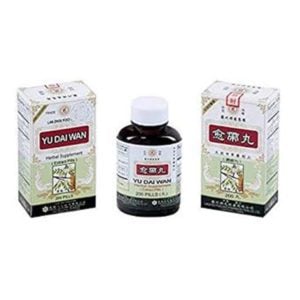 Solstice Medicines (Ci Brand) – Yu Dai Wan
Solstice Medicines (Ci Brand) – Yu Dai Wan
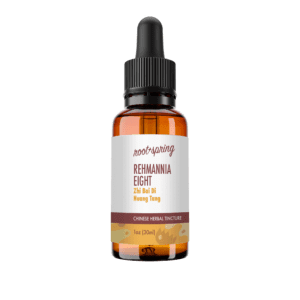 Zhi Bai Di Huang Tang (Rehmannia Eight) – Liquid Extract (Tincture)
Zhi Bai Di Huang Tang (Rehmannia Eight) – Liquid Extract (Tincture)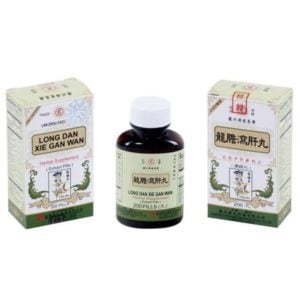 Solstice Medicines (Ci Brand) – Long Dan Xie Gan Wan
Solstice Medicines (Ci Brand) – Long Dan Xie Gan Wan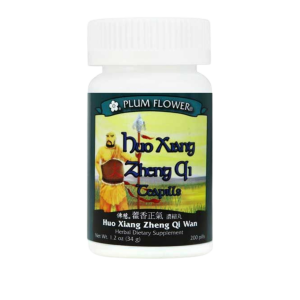 Plum Flower – Huo Xiang Zheng Qi Wan
Plum Flower – Huo Xiang Zheng Qi Wan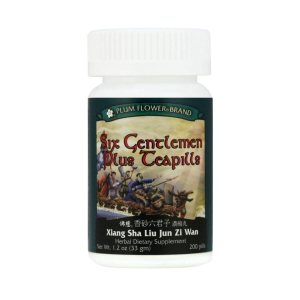 Plum Flower – Six Gentlemen Plus Teapills (Xiang Sha Liu Zi Wan)
Plum Flower – Six Gentlemen Plus Teapills (Xiang Sha Liu Zi Wan)